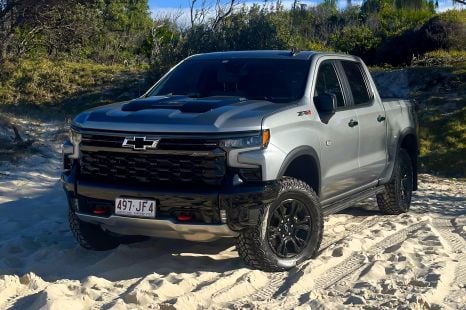

William Stopford
2025 Chevrolet Silverado ZR2 review
1 Month Ago
The Ford Ranger XLT is the most kitted-out workhorse variant. See how it fared after 3000km of CarExpert testing.
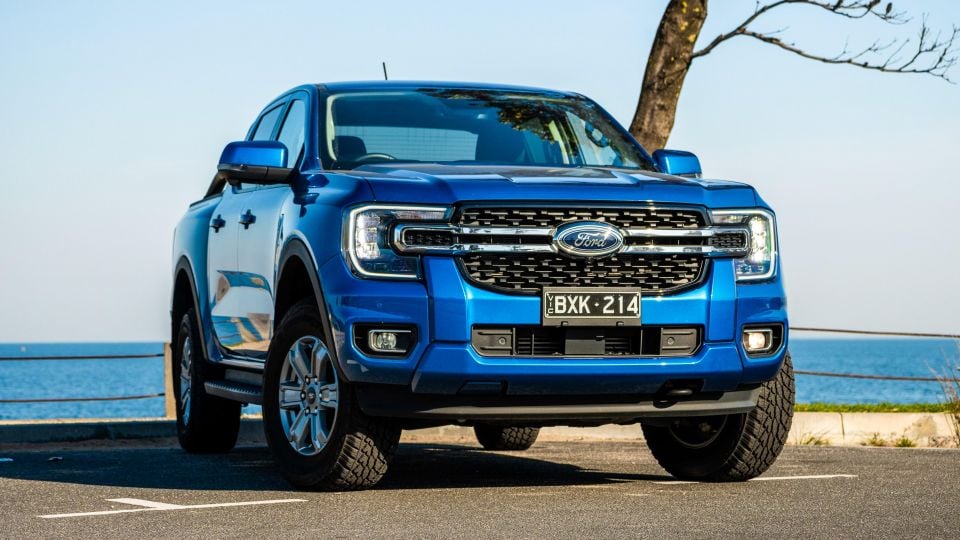
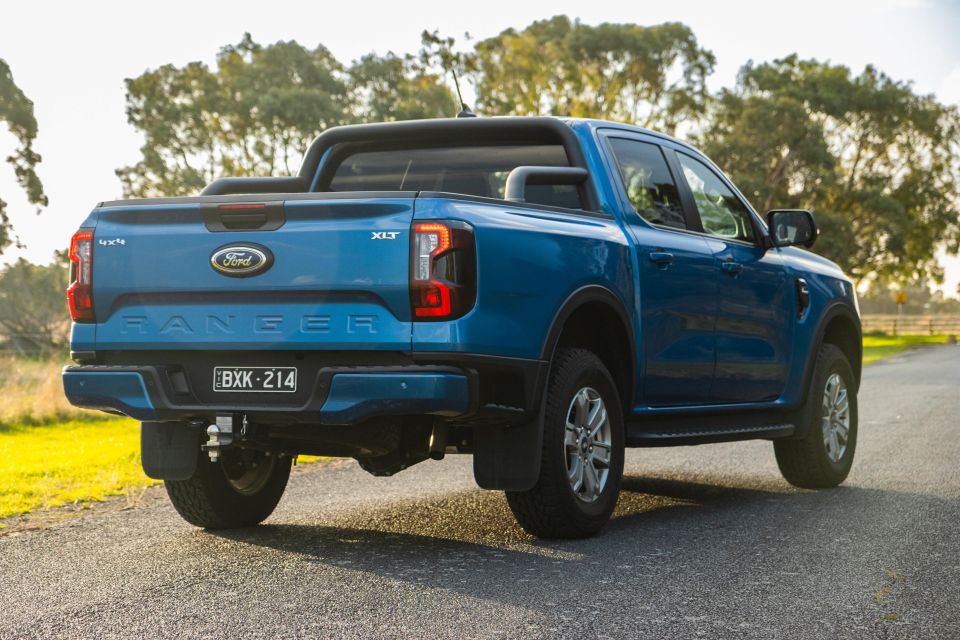

Quickly see how this car stacks up against its competition. Select any benchmark to see more details.
Where expert car reviews meet expert car buying – CarExpert gives you trusted advice, personalised service and real savings on your next new car.
The Ford Ranger was one of the most anticipated new vehicle launches in Australia last year, and it has now been on sale for almost 12 months.

Since launch the Ranger has been tussling with the Toyota HiLux for number one spot on Australia’s new car sales charts. The Ranger is currently winning by an ever-so-slight margin in 2023.
For the 2023 model year, the Ranger line-up received a few specification changes, a price increase, as well as a few new variants.
Our fully-optioned mid-spec XLT 4×4 dual-cab pickup on test was a MY22 example, but current versions now get an auxiliary switch bank and a cargo management system with spring-loaded cleats.
Our tester also came equipped with the 2.0-litre Bi-Turbo four-cylinder diesel engine that is more readily available than the in-demand 3.0-litre V6 turbo-diesel engine.
Read along to find out how the Ranger XLT 4×4 dual-cab pickup with the Bi-Turbo engine fared over roughly four months and 3000km of testing.
P.S. Thank you to Sean Lander, one of our videographers, for contributing his findings to this review.
There are now 24 permanent variants in the sprawling Ford Ranger line-up, with the XLT being the mid-range offering.
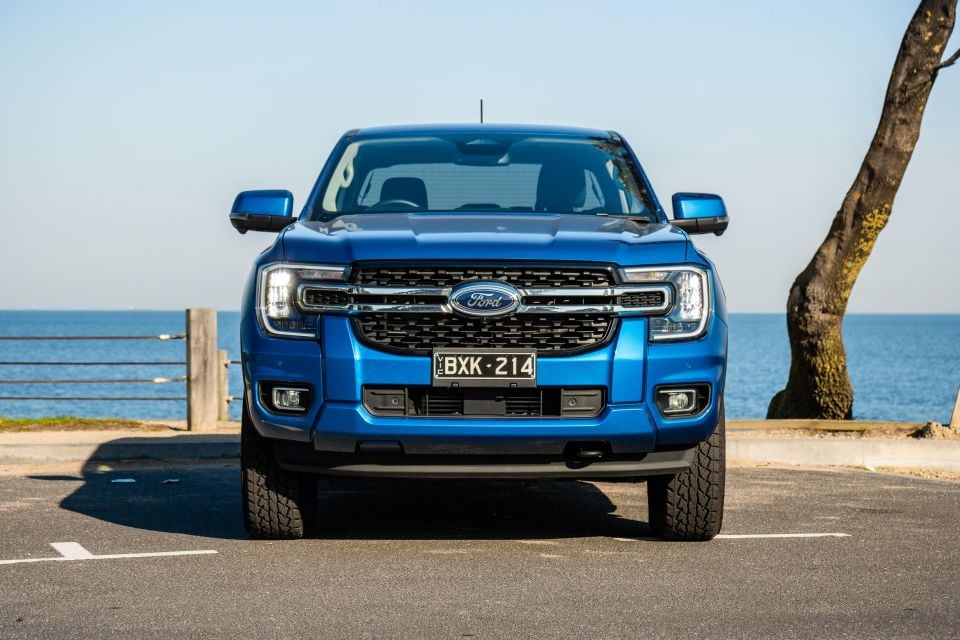
The Ford Ranger XLT 4×4 dual-cab pickup with the 2.0-litre Bi-Turbo four-cylinder turbo-diesel engine starts at $61,990 before on-road costs, which is around the same asking price as a number of almost flagship dual-cab utes.
Our tester was finished in Blue Lightning exterior paint which costs an additional $700 and was fully-loaded with options. This includes the $500 all-terrain tyres, and $400 tough spray-in bedliner.
It also includes the $1295 Touring Pack which adds a surround-view camera, four-zone exterior lighting, side mirror puddle lamps, auxiliary six-switch pack, and a cargo management system with spring-loaded cleats.
The two latter features weren’t on our tester as it was an older MY22 examples, with them getting added to the Touring Pack for the latest MY23.5 examples.
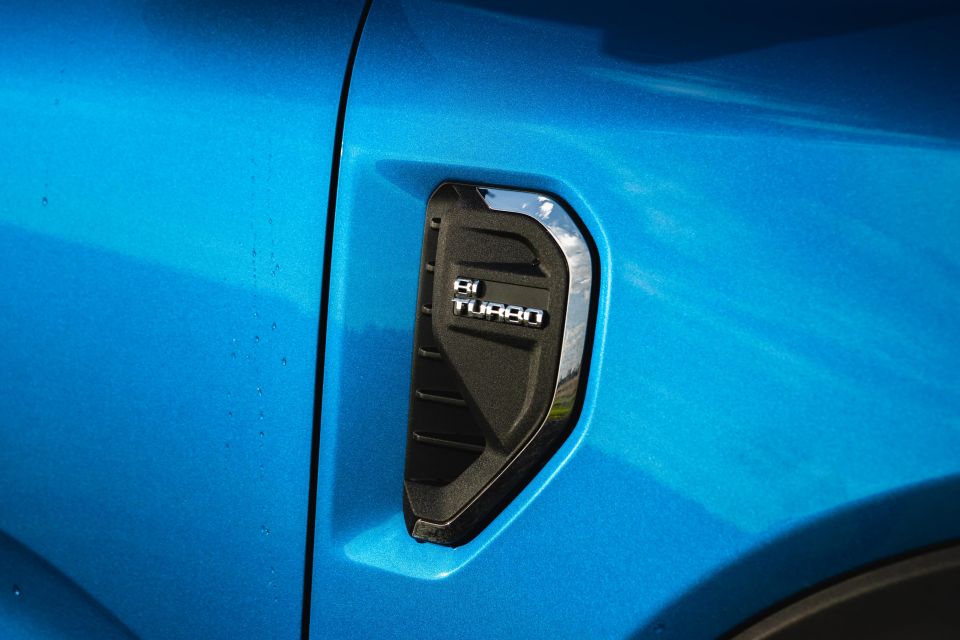
Tallying this all together brings the asking price of our Ford Ranger XLT tester to $64,885 before on-road costs, or $70,666 drive-away for Victorian buyers (each state has slightly different taxes).
Similarly priced rivals include:
The Ranger XLT grade is available with the in-demand 3.0-litre V6 turbo-diesel engine for an additional $3200, at $65,190 before on-roads.
Prices are before on-road costs
Buy your new car without the stress. It's fast, simple and completely free.
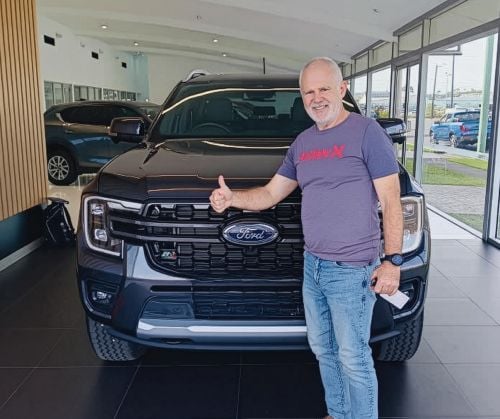
Great service from Travis and team, second time I have used this business would not hesitate to recommend them to anyone
Craig C.
Purchased a Ford Ranger in Sunshine Coast, QLD
CarExpert helped Craig save $7,224 on his Ford Ranger, now let us save you on your next new car.
Get your BEST priceGetting into the Ford Ranger XLT you’ll first need to plan your entrance because it’s higher than you think. Thankfully there are side steps and a number of grab handles to make this as graceful as possible.
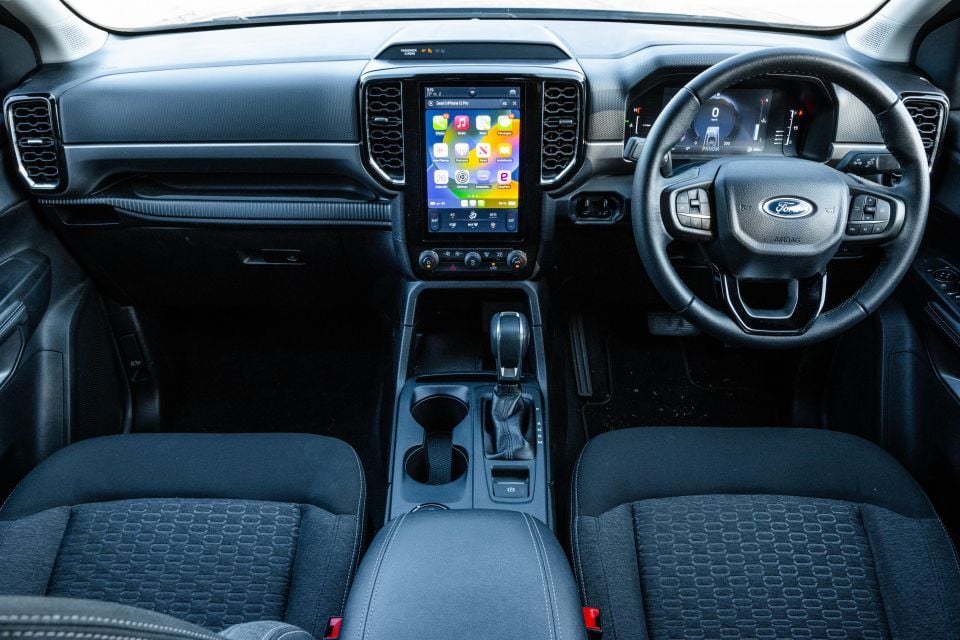
Despite the help I found it still took me two scoots to get in the ute and sitting comfortably.
Although there are a few softer plastics in high touch-point areas like the armrests, the Ranger XLT’s interior is largely filled with harder plastics. This is to be expected given the workhorse nature of this ute.
Over our testing of the Ranger no major creaks or rattles developed around the interior which is great to see. The doors still made the distinct Ford thunk too when closing.
Something to note is the XLT misses out on the tradie-style cupholders that are mounted on the dash. You need to step all the way up to the Wildtrak to get that. Instead there are awkward cavities that can’t really be used for anything because stuff falls out upon acceleration.
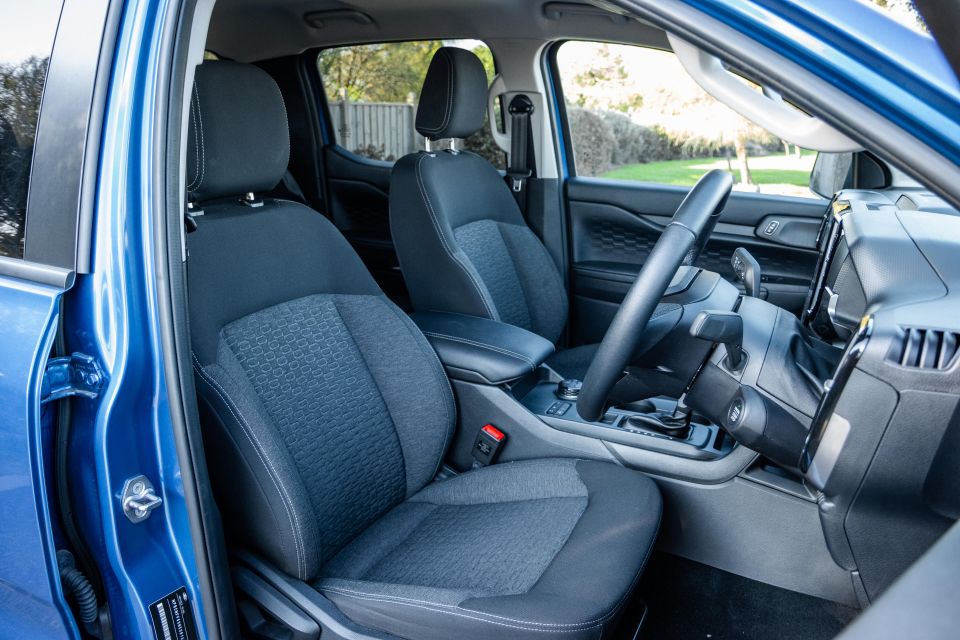
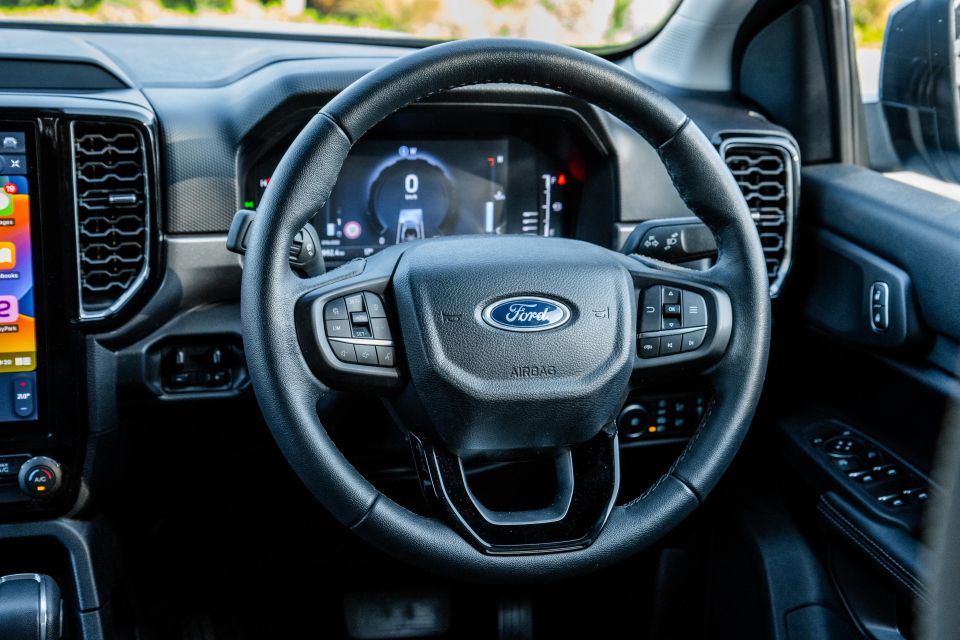
Another thing is the door handle isn’t where you’d think it would be. It’s in the space where you would close the door. Even though I know this quite well by now, I still get briefly confused every now and then.
The seats wear fabric upholstery and look like they should stand the test of time. They have a black and dark drey design that’s inoffensive with a lighter grey insert in the middle.
The driver’s seat is entirely manually adjustable but it’s still really easy to find a comfortable driving position. This helped by the steering wheel that has a wide range of adjustability for tilt and reach. You can basically have the steering wheel in your lap if you’d like.
Speaking of the steering wheel, it’s a chunky leather-wrapped unit that’s not as soft as the one in other utes. This is completely understandable though given the XLT is a workhorse-oriented variant.
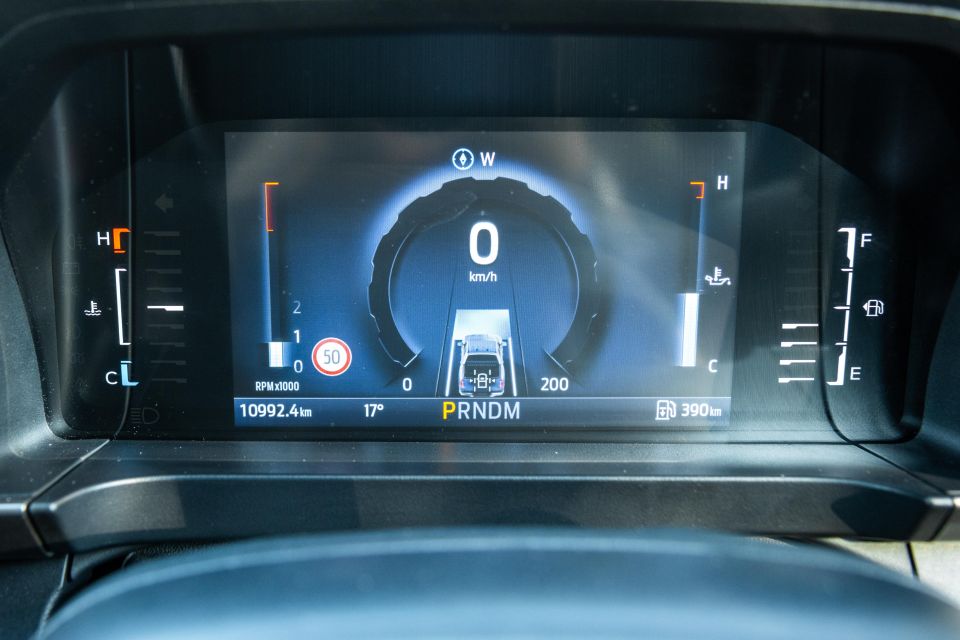
There are a range of buttons on the steering wheel that operate the typical sound system and cruise control adjustments, and all of them have a somewhat spongey operation. This is unlike the two rocker switches on the steering wheel that have a very precise and firm feel.
Ahead of the driver is a 8.0-inch digital instrument cluster that’s incredibly configurable, yet a little on the small side.
The screen can display a range of pages including Trip/Fuel, Off-Road, Towing, Audio, Phone, Navigation, and Vehicle Maintenance, while owners can choose certain page to put in their own curated ‘MyView’ page.
If all this information on the digital instrument cluster is too much, you can instead opt for the minimalist approach and just have the bare necessities like the speed, revs, and perhaps the fuel economy if you’re feeling daring.
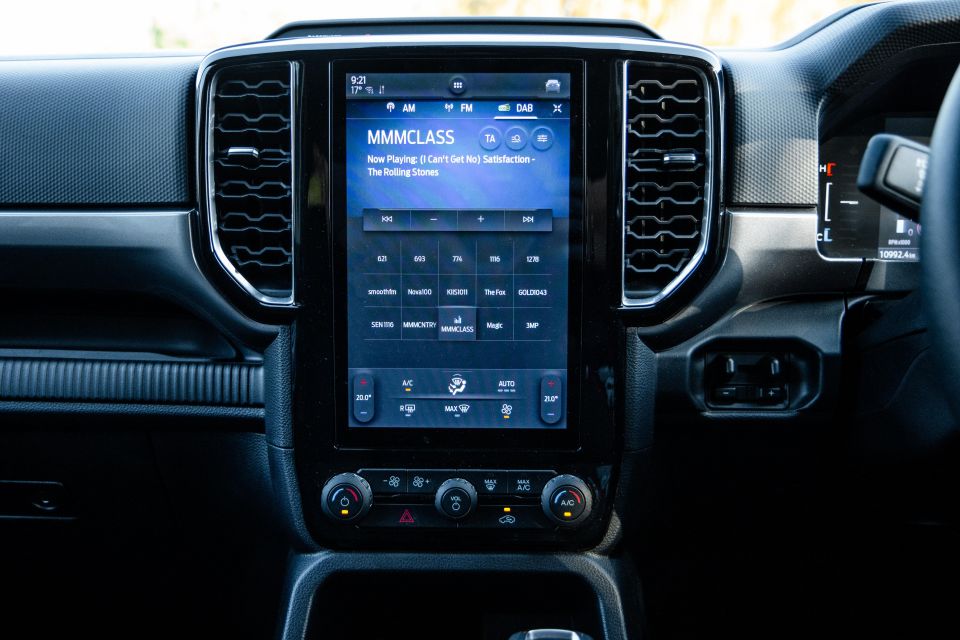
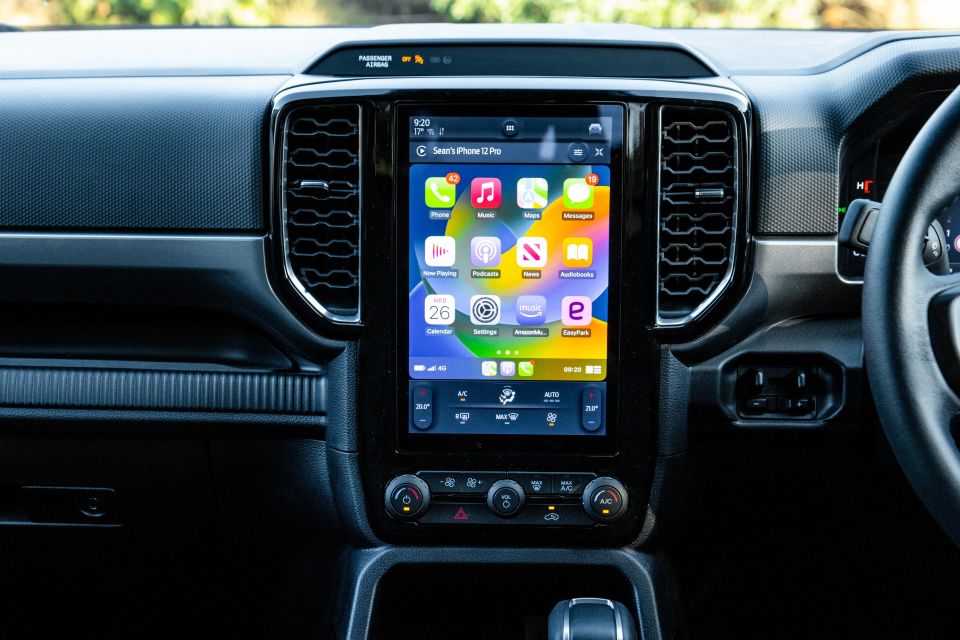
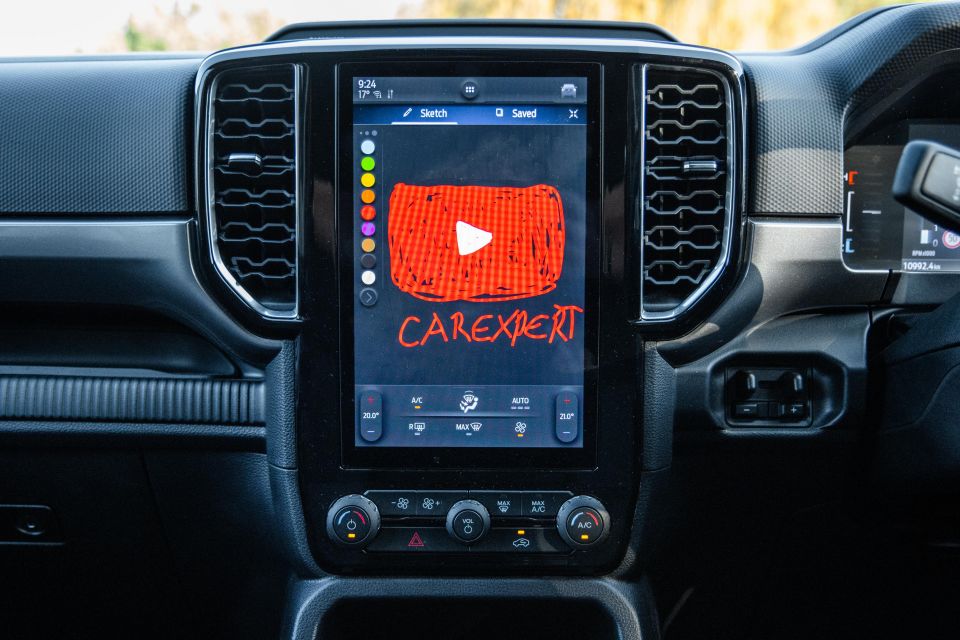
As noted before, the 8.0-inch digital instrument cluster is a little small and it would be nice to have the larger 12.4-inch unit used on the Platinum and Raptor. Despite this, the base screen still tells you all you need to know.
Moving across, the Ranger XLT comes with a portrait-oriented 10.1-inch touchscreen infotainment system running the latest SYNC 4A software that looks very high-resolution but is an absolute fingerprint magnet. There’ll be even more smudgy fingerprints if you find the ‘Sketch’ section too.
The system itself appears to have enough processing power, which means it starts up and loads pretty quickly. There were a few instances though were the screen would lag a bit when swiping or trying to do a few things at once, however.
Apple CarPlay and Android Auto are available in both wired and wireless varieties. You can change choose between two sizes for the smartphone mirroring, with a larger square or smaller rectangular aspect ratio. The latter of these frees up a range of shortcut buttons.
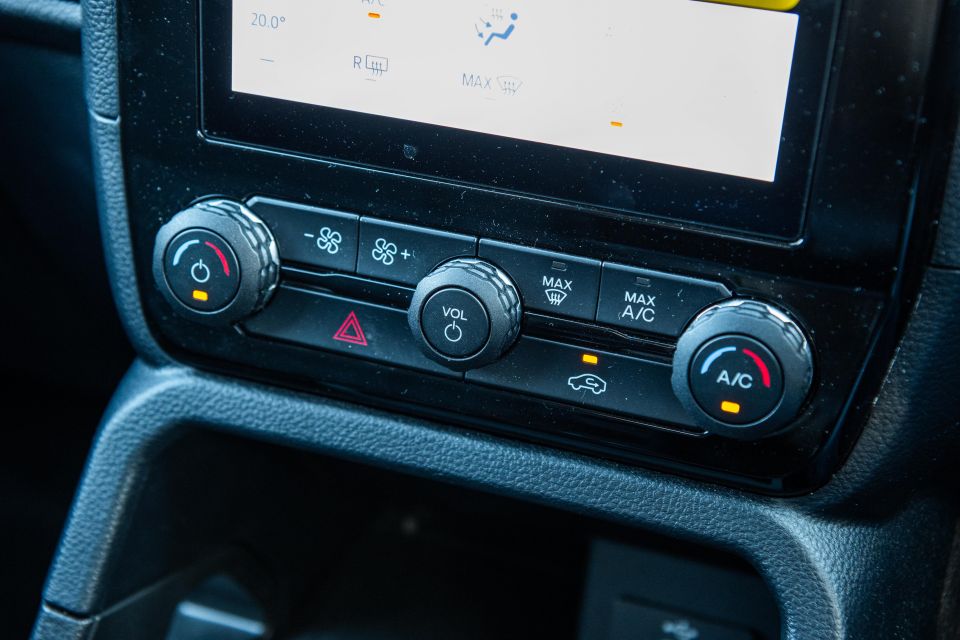
Although the Ranger XLT offers wireless smartphone mirroring, it doesn’t have a wireless phone charger, which means you need to be mindful of your phone’s battery level. You need to step up to the Ranger Wildtrak to get a standard wireless phone charger.
Satellite navigation comes as standard on the Ranger XLT and it’s extremely easy to use. Searching up points of interest takes no time at all, making the process feel simple and natural.
One strange part of the Ranger’s interior are the climate controls. Part are integrated into the touchscreen, whereas the other part are physical buttons and knobs.
There’s a weird double of the temperature controls, with it able to be adjusted either by physical dials or by tapping the screen. I don’t really see the point of having both…
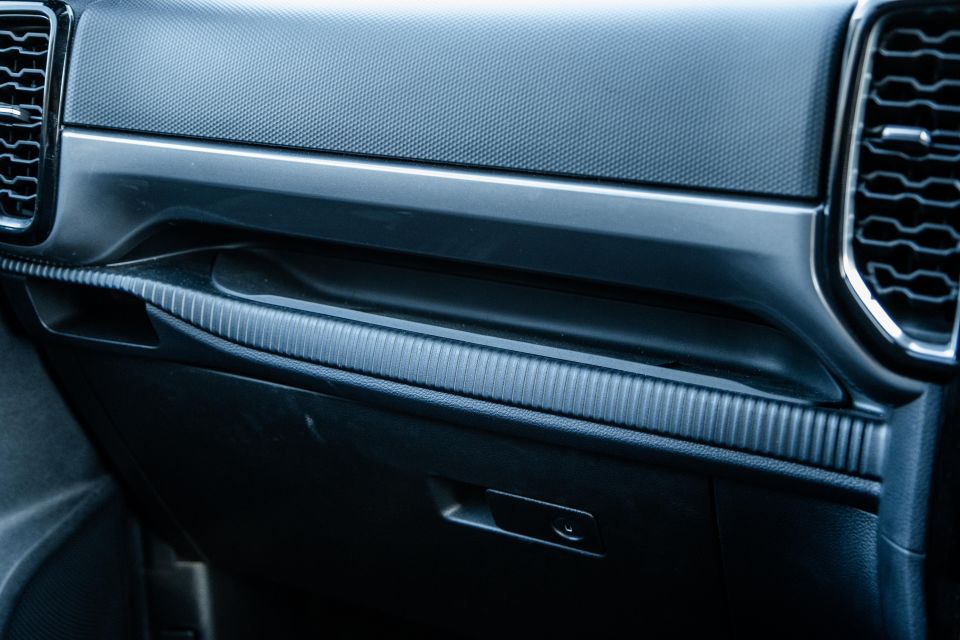
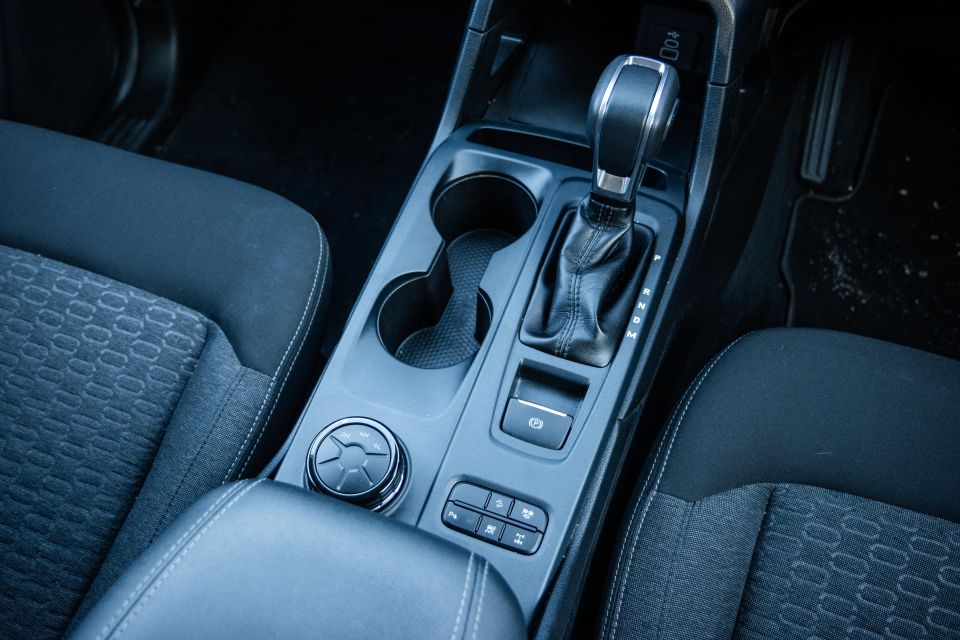
Around the cabin there’s a decent amount of storage, from a huge centre armrest, two cupholders, and a special chips holder in front of the gear selector.
It’s worth pointing out our tester with its Bi-Turbo engine comes with a regular gear shifter, rather than the e-shifter that comes with the V6 diesel.
Although the regular shifter sticks up higher than the e-shifter, it sits at a comfortable level in line with the centre armrest. You also won’t be putting it in the wrong gear accidentally.
Moving to the second row there’s a noticeable drop in interior quality, with a more liberal application of harder plastics.
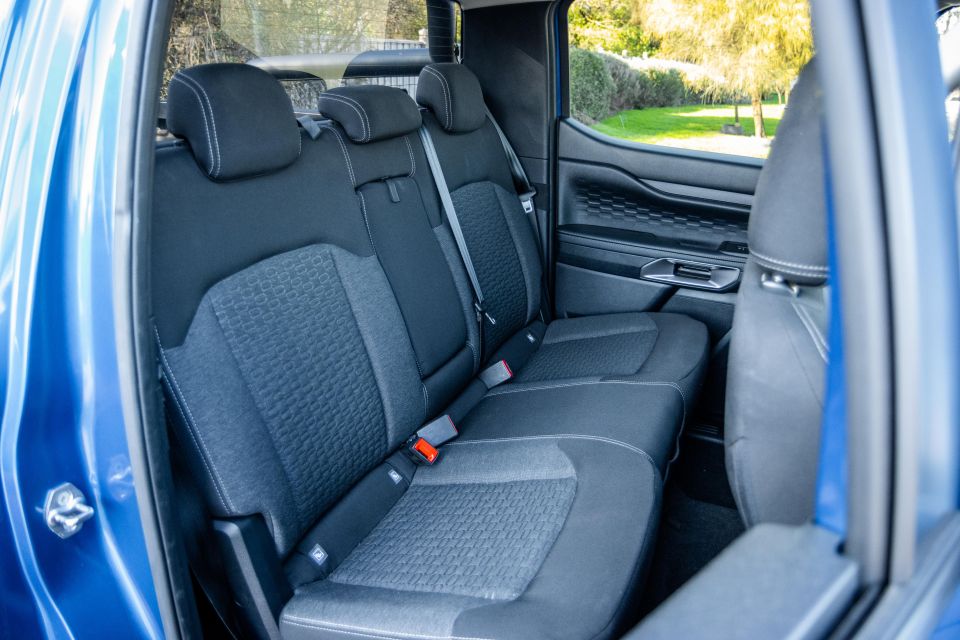
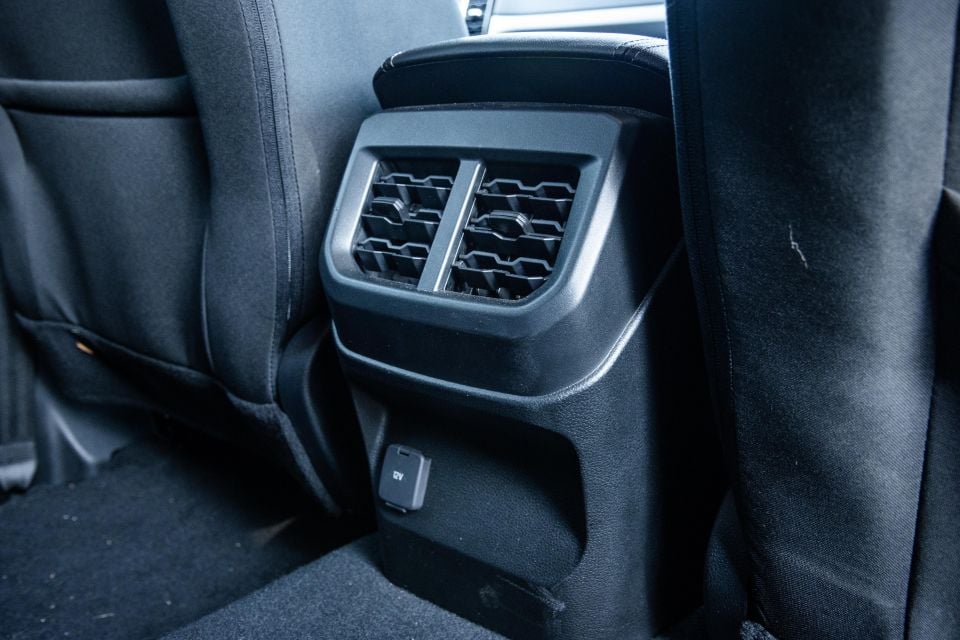
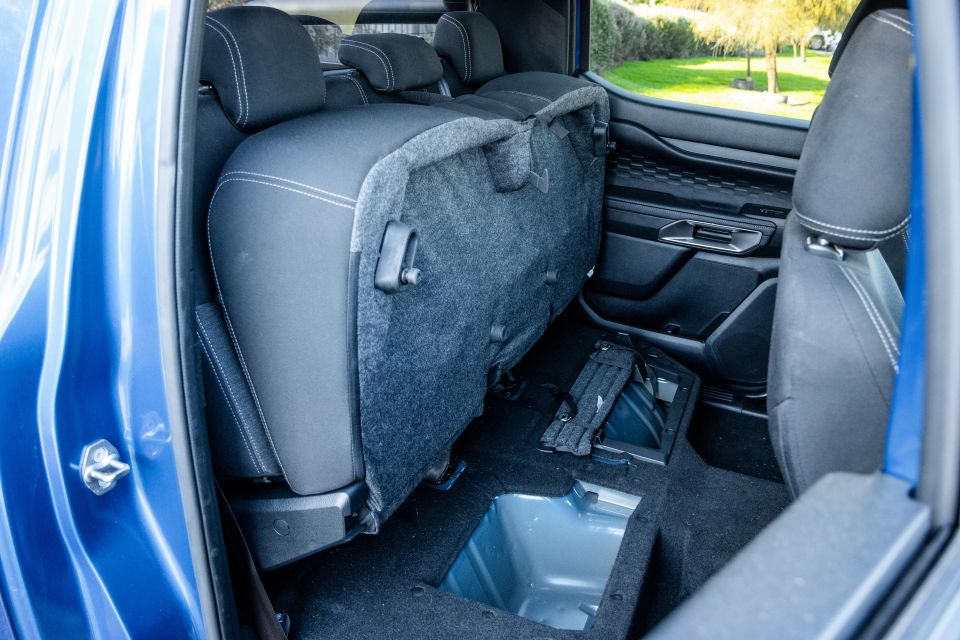
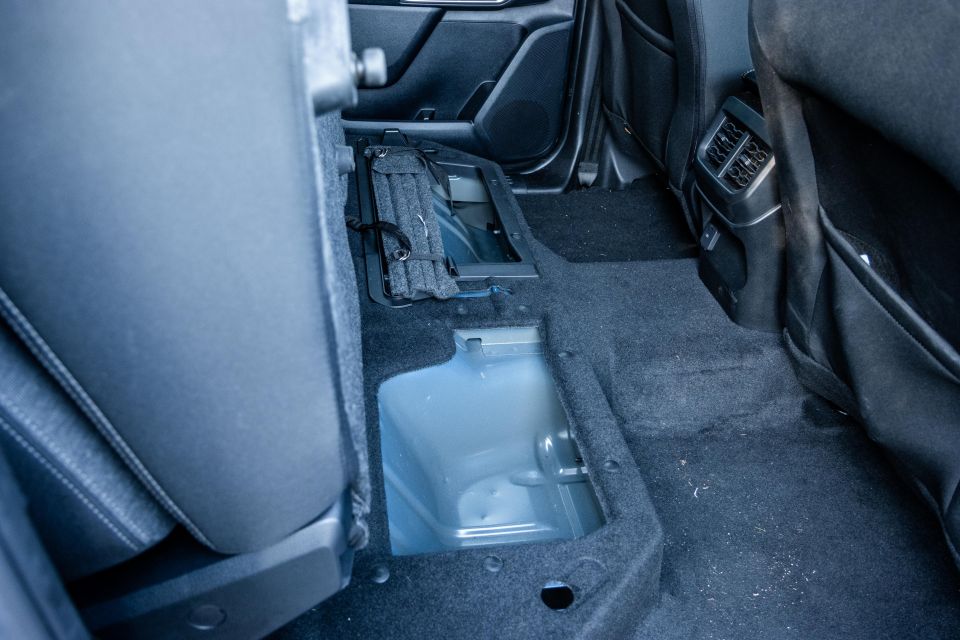
The rear bench seat is definitely harder than the front, though at a leggy 182cm I still had plenty of leg, head and shoulder room.
In terms of second-row amenities, there’s a fold-down armrest with two cupholders, some air vents on the back of the centre console, as well as a 12V socket. There are strangely no USB ports…
The tub on the Ranger XLT dual-cab pickup measures in at 1464mm long, 1520mm wide, and 831mm tall. It’s also 1217mm wide between the wheel arches. This amount of space is on par with rivals in the segment.
Our tester was optioned with the tough spray-in bedliner for an additional $400, as well as the $1295 Touring Pack that adds an auxiliary six-switch pack, four-zone lighting, puddle lamps on the side mirrors, a surround-view camera, and a cargo management system with spring-loaded cleats.
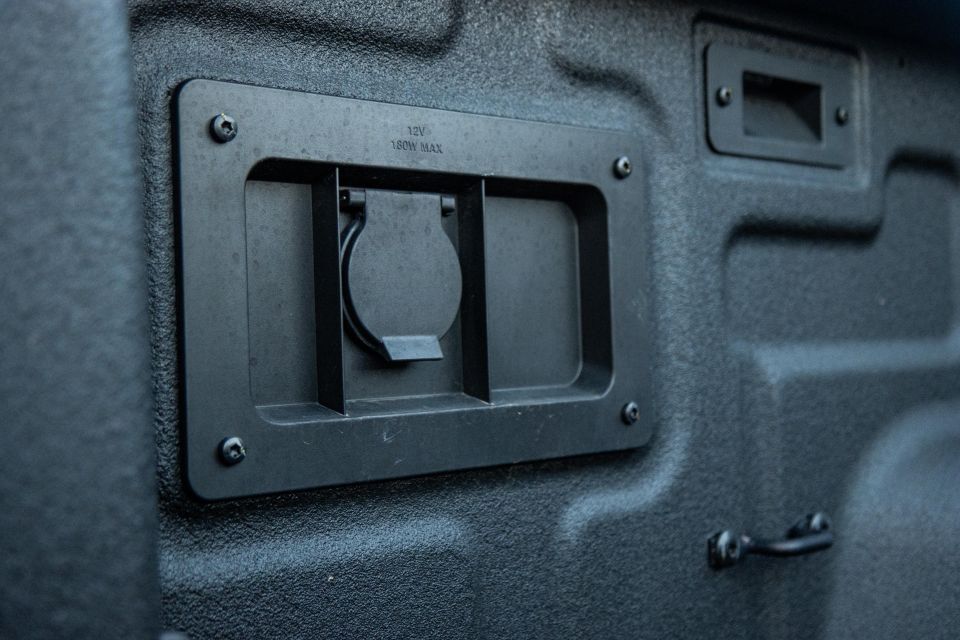
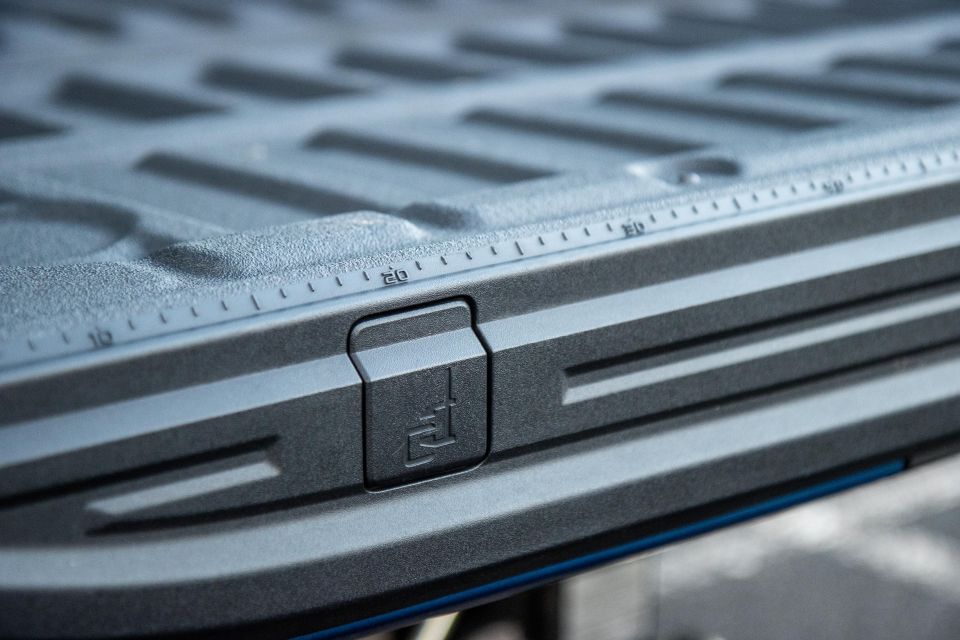
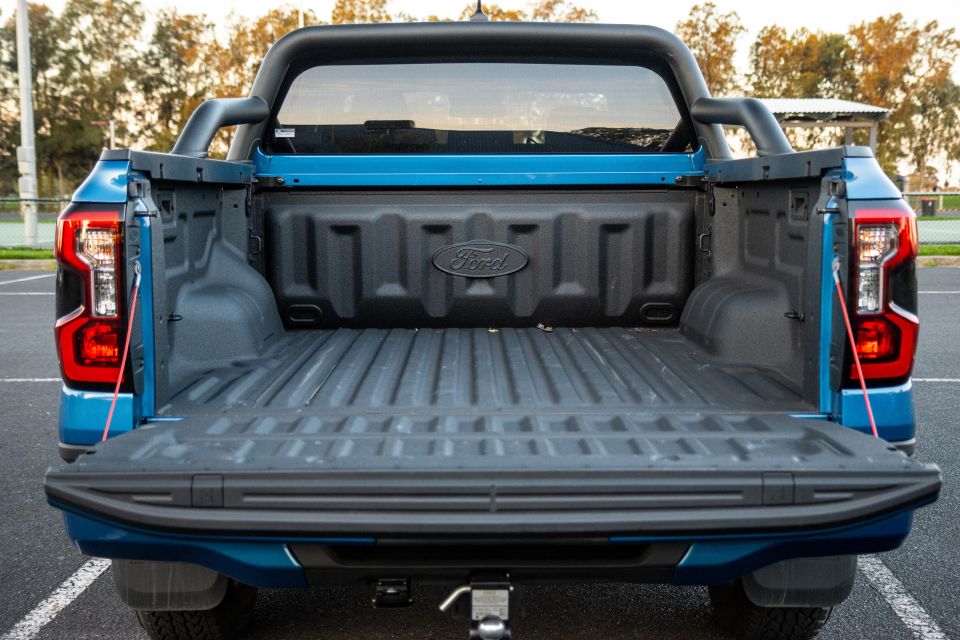
The auxiliary six-switch pack and cargo management system from the Touring Pack weren’t on our tester because it was an older MY22 example and not the latest MY23.5 spec.
Convenience items in the tub include hooks, clamp holders, lighting, and a 12V socket. The tailgate has a torque rod, which makes lifting it up considerably easier, and it’s also part of the central locking unlike a number of its rivals.
To read more about the Ford Ranger’s clever tub details, click here.
The 2023 Ford Ranger is available with a total of four different turbocharged powertrains, depending on the variant.
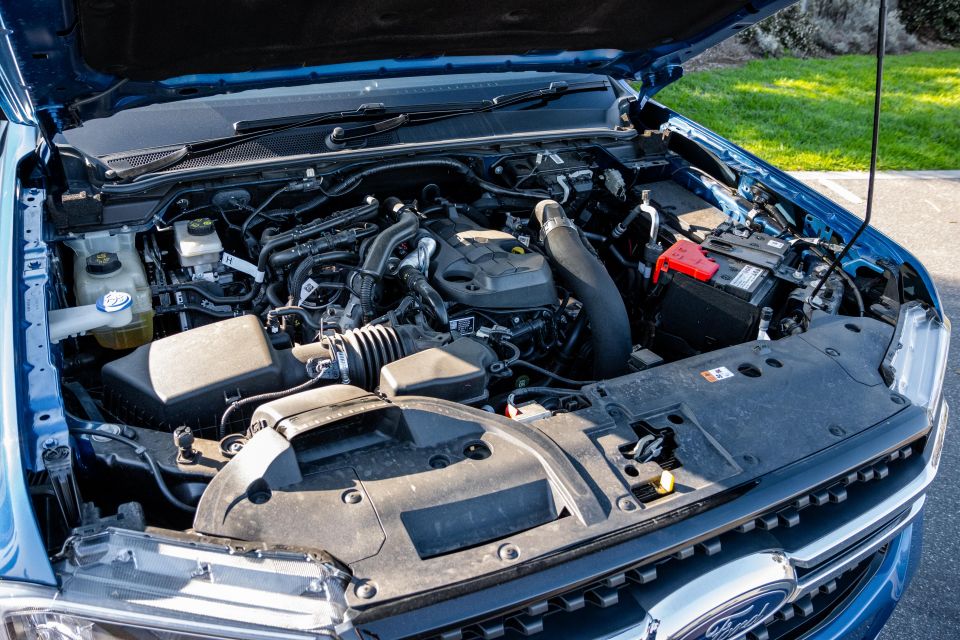
Our XLT tester came fitted with the familiar 2.0-litre Bi-Turbo four-cylinder diesel engine producing 154kW of power and 500Nm of torque.
This is mated exclusively to a 10-speed automatic transmission, with drive in our tester sent through a part-time four-wheel drive system with 2H, 4H and 4L modes. There’s also a locking rear differential.
The following drive modes are available:
It’s worth noting the Ranger XLT is also available with a two-wheel drive version of the 2.0-litre Bi-Turbo four-cylinder diesel engine, as well as with the 3.0-litre V6 turbo-diesel with a full-time four-wheel drive system including a 4A mode.

Where expert car reviews meet expert car buying – CarExpert gives you trusted advice, personalised service and real savings on your next new car.
Claimed combined fuel economy for the Ranger XLT 4×4 dual-cab Bi-Turbo is 7.6 litres per 100km, though during our largely urban- and unladen-based testing spanning roughly 3000km we saw an average of around 10 litres per 100km. This real-world fuel consumption figure is line-ball with a number of its rivals.
Ford claims a 3500kg braked towing capacity across the entire Ranger line-up, except for the Raptor, while unbraked towing is capped at 750kg. Payload for our tester is 980kg.
Starting up the Ford Ranger XLT with the Bi-Turbo engine you’ll be greeted by a familiar agricultural clatter that’s common amongst four-cylinder turbo-diesel utes.
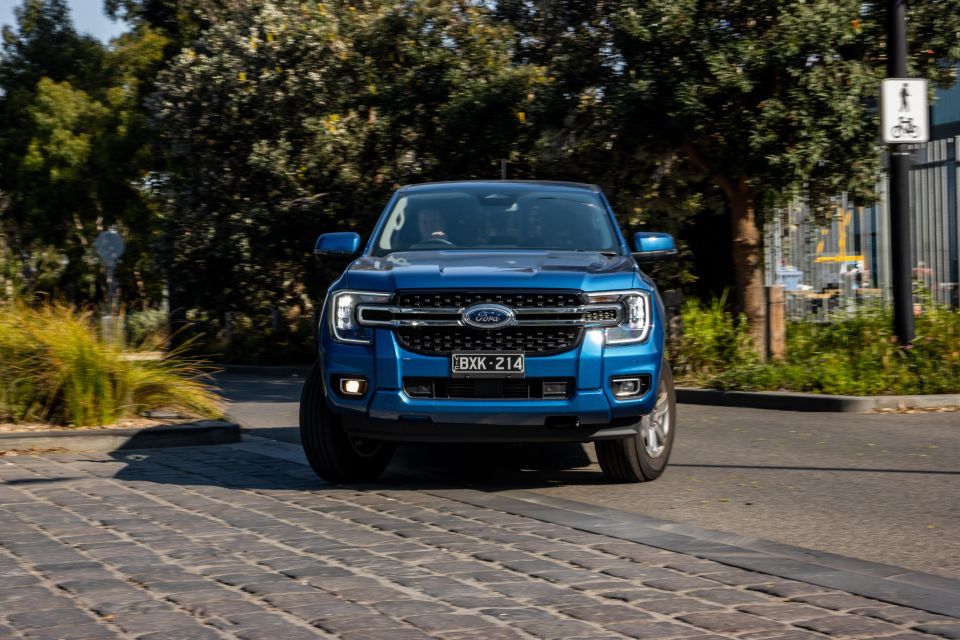
Thankfully it’s not too gruff and quietens down once the engine warms up.
From standstill there’s plenty of power and torque. Sure it doesn’t have the outputs of the V6, but with respectable and segment-matching outputs of 154kW and 500Nm, you’ll be keeping up or even pulling away from traffic at the lights with ease.
This is quite surprising given the XLT Bi-Turbo dual-cab’s hefty kerb weight of 2250kg.
The Bi-Turbo engine is mated exclusively to a 10-speed automatic transmission, which can sometimes get a little bit confused at low speeds and in stop-start traffic. It’s like it has too many gears to choose from and gets a little lurchy.
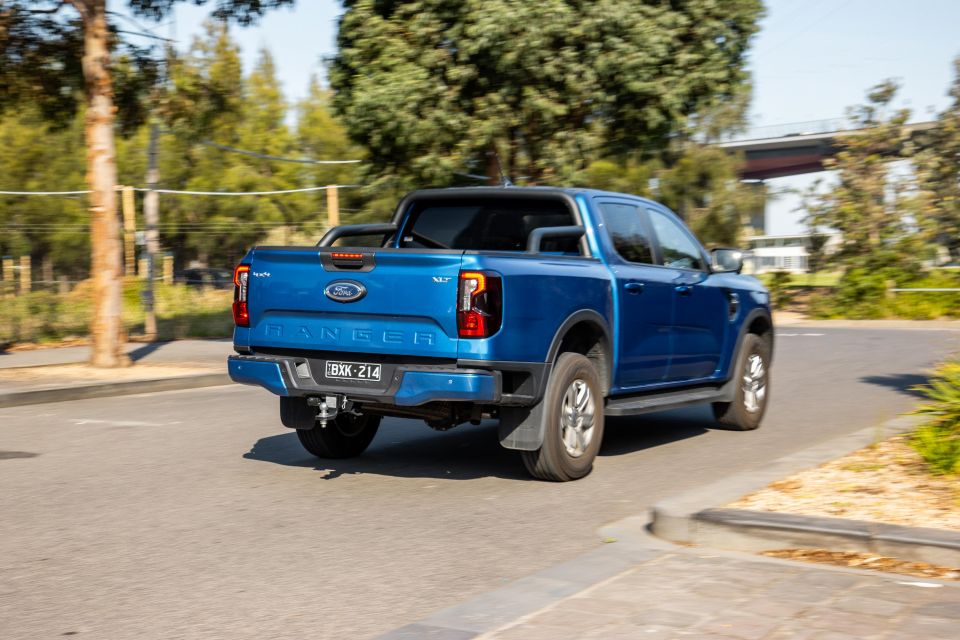
The transmission eventually sorts things out and once you’re at speed it’s great to have a ratio that keeps the revs exactly where peak torque is, which is between 1750 and 2000rpm.
The Ranger has light steering, unlike a number of its rivals, which makes it feel smaller than it is when manoeuvring around places like urban carparks. There’s no escaping its 5.4-metre length though.
Outward visibility is plentiful from the driver’s seat, thanks to the commanding driving position and the large glasshouse. The side mirrors are also incredibly large which is handy for when you need to check what’s beside you.
In urban environments the ute’s suspension is extremely compliant, even when unladen, which is a little unexpected given how some utes react to things like speed bumps.
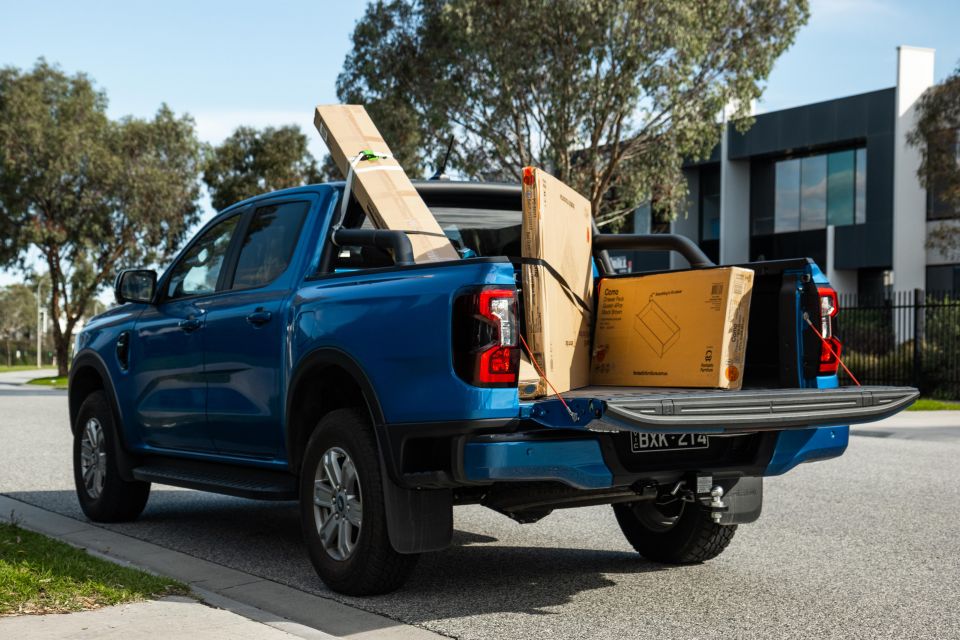
Things can get still a little bouncy when you don’t have any weight in the back, but the current-generation Ranger is definitely one of the most comfortable utes with rear leaf springs to drive unladen.
Sean found there wasn’t a huge difference in terms of ride comfort with a load in the back, and also noted it was easy to secure a load in the tub thanks to the large amount of tie down points and the sports bar that can be used to secure a load with.
Something to note is the Ranger XLT with the Bi-Turbo engine only comes with a part-time four-wheel drive system with 2H, 4H, and 4L modes.
Seeing it misses out on the V6’s full-time four-wheel drive system with 4A mode, it’s only rear-wheel drive on sealed surfaces, which isn’t ideal in rainy or slippery situations. 4H and 4L can only be used on unsealed roads.
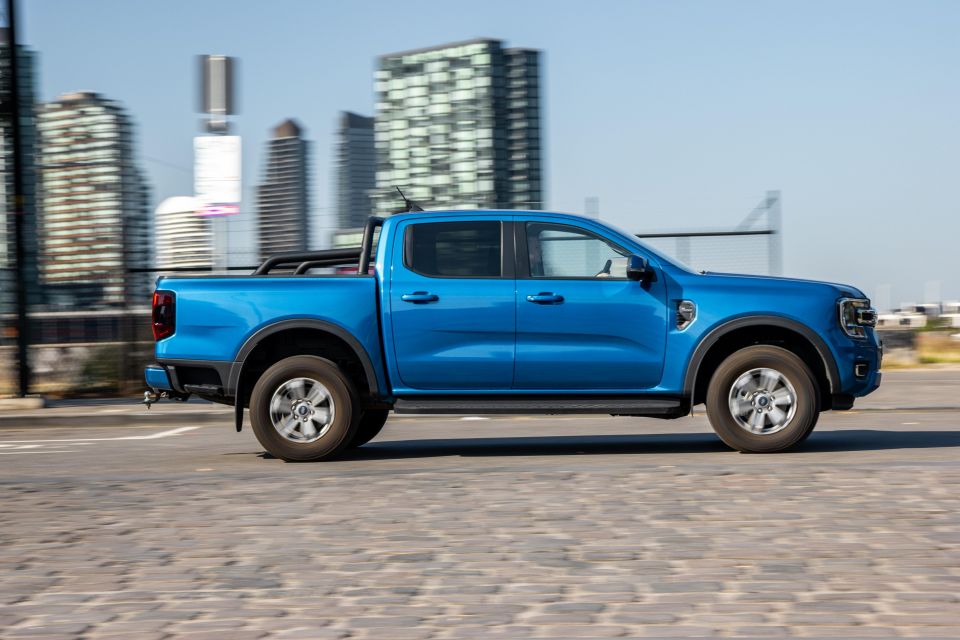
Our tester came fitted with the optional all-terrain tyres, which Sean said don’t perform greatly in the wet. The ute can understeer through wet roundabouts at low speeds, and the tyres tend to lock up under hard braking.
When you dial up the speed in the Ranger XLT Bi-Turbo the engine settles down even more and it feels like the ute enters its sweet spot. There is a little bit of tyre noise emanating from the wheel wells, but it doesn’t ruin the overall ambience.
Sean did a number of highway stints in our tester and said the driving experience was very smooth, comfortable and stable, even in crosswinds.
If you stab the accelerator for an overtake you can sometimes catch the Ranger napping. If you plan ahead and roll onto the accelerator gradually you’ll be completely fine though.
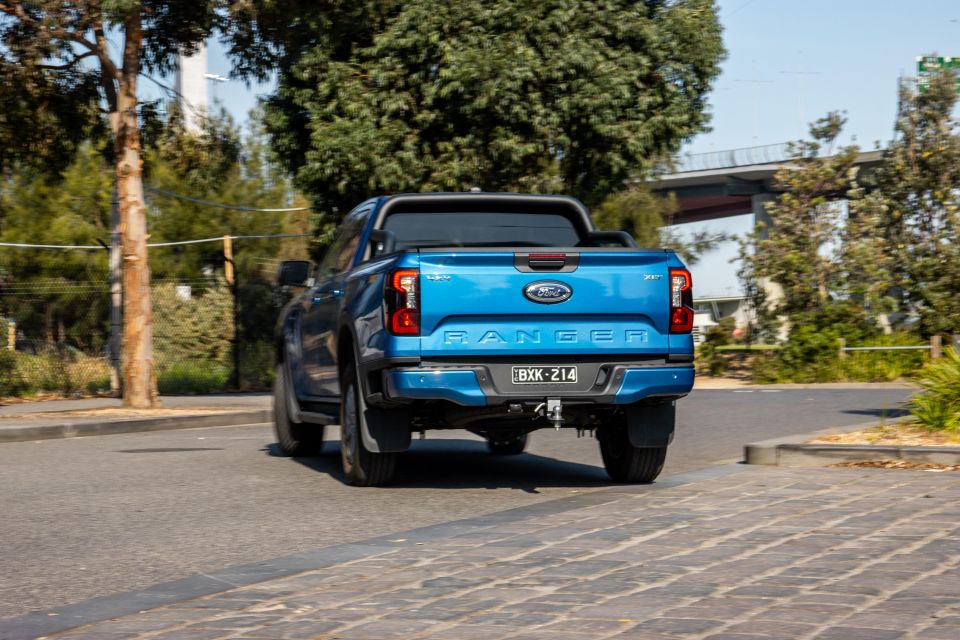
On the safety front, the Ranger XLT is fully loaded and comes equipped with plenty of active safety equipment including autonomous emergency braking (AEB), blind-spot monitoring with trailer coverage, lane-keep assist, lane-departure warning, blind-spot assist, and rear cross-traffic alert.
The adaptive cruise control system is outstanding according to Sean and I have to agree. Its response to vehicles is really natural as it accelerates progressively and it doesn’t overreact and brake heavily when vehicles pull in front of you.
The lane-keep assist works really well and takes a fair bit for it to get confused. The same goes for the lane centring function which is really strong and correct for the most part.
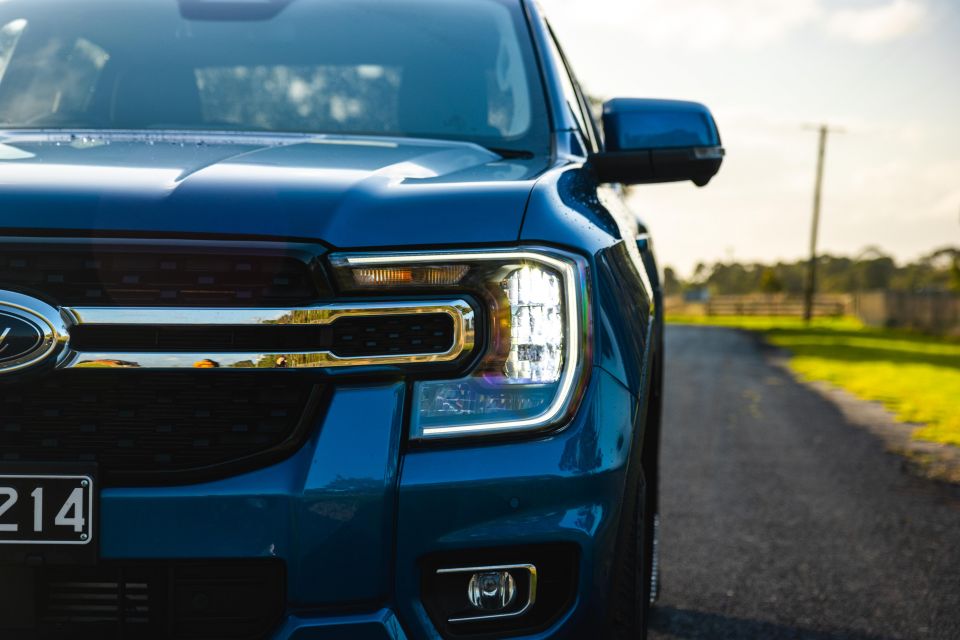

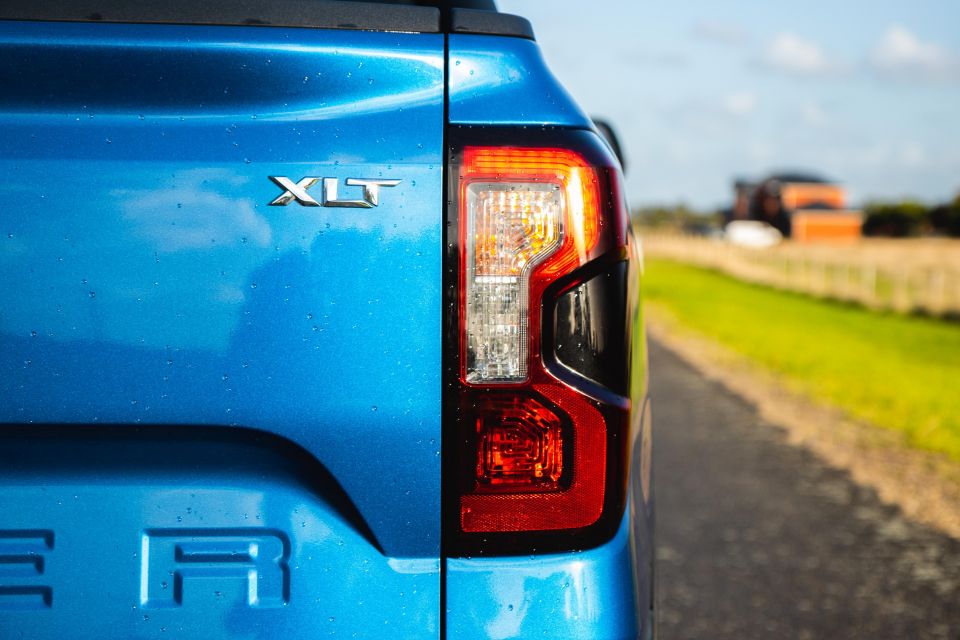
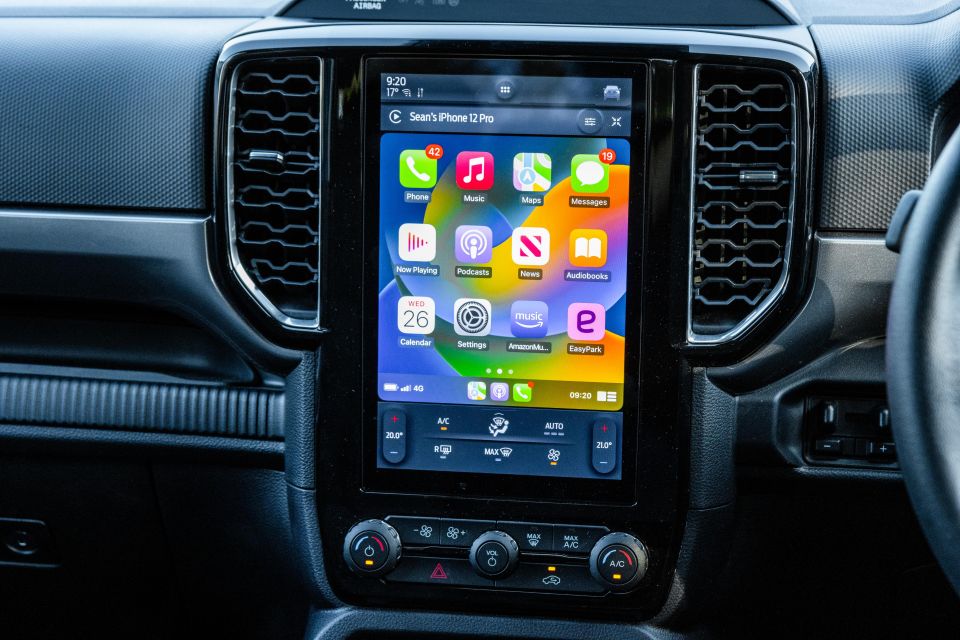
Ford Ranger XLT highlights:
Exterior
Interior
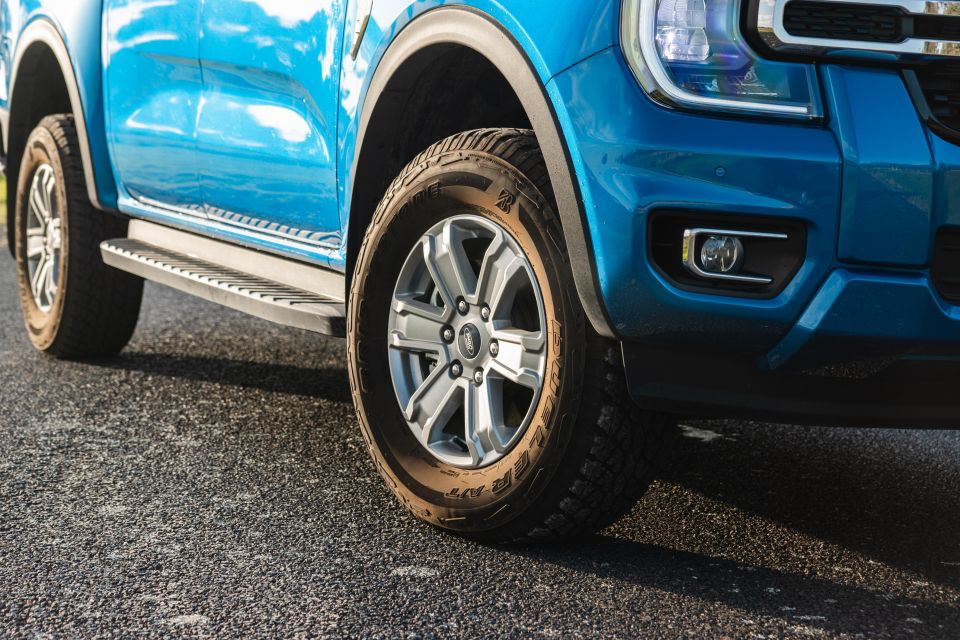
The $500 XLT 17-inch All-Terrain Tyre Pack for 4×4 models adds:
The $650 XLT 4×2 Off-Road Pack adds:
The $1295 Touring Pack (4×4 pick-up only) adds:
All variants of the 2023 Ford Ranger line-up received a five-star ANCAP safety rating in September last year, except for the Ranger Raptor which remains unrated.
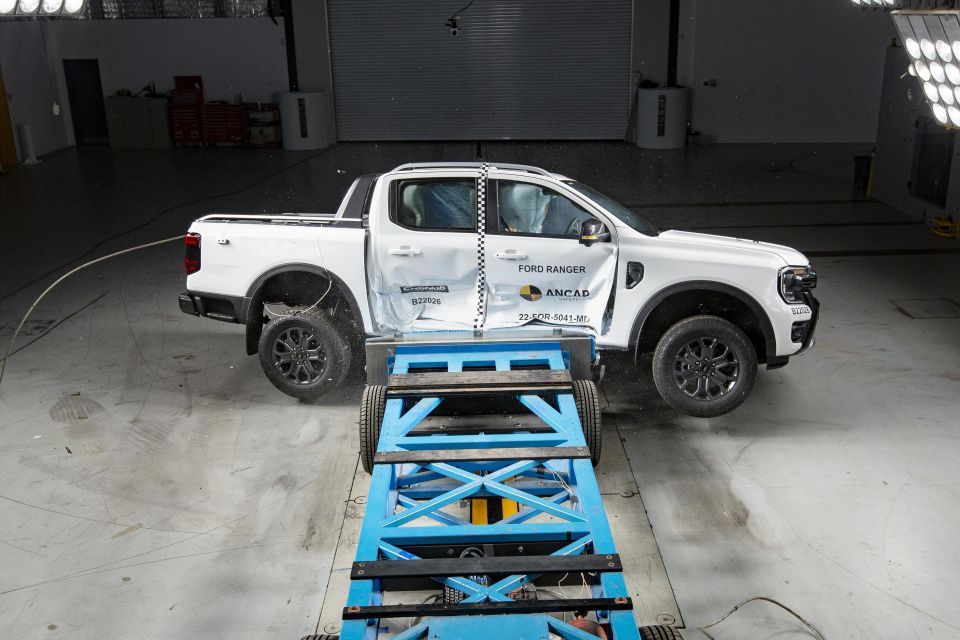
Category scores included 84 per cent for adult occupant protection, 93 per cent for child occupant protection, 74 per cent for vulnerable road user protection and 83 per cent for safety assist.
Vehicles built before August 20 2022, however, will need a software update to their lane-keeping software to mirror the specifications of five-star vehicles. Ford says dealers will carry out the update at an owner’s next service.
Standard safety equipment includes:
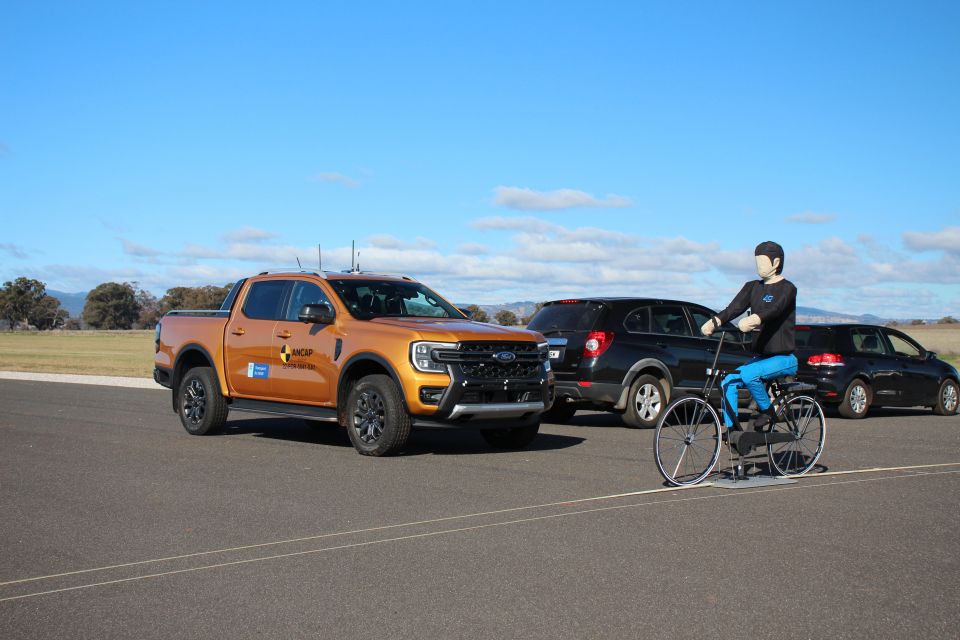
Ranger XLT adds:
The optional Touring Pack adds a surround-view camera, while stepping up to the Wildtrak and above adds the Active Park Assist 2.0 system.
The Ford Ranger is covered by a five-year, unlimited kilometre warranty, like the rest of the Ford range.
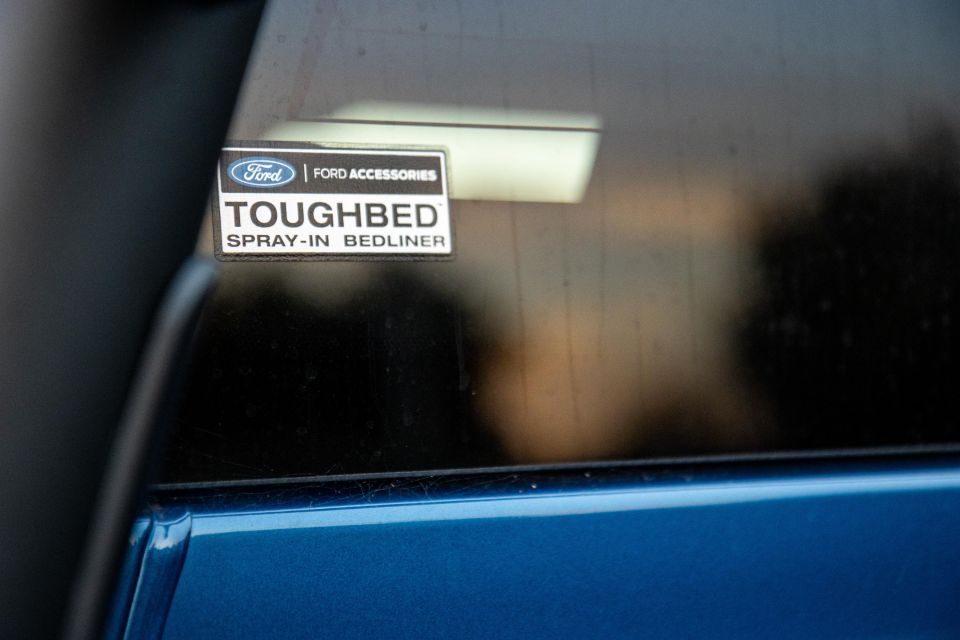
Logbook servicing is required every 15,000km or 12 months, whichever comes first, with the first four visits capped at $329. This equals $1316 for four years or 60,000km.
This four-year total service pricing is considerably more affordable than the related Isuzu D-Max ($2100) and Mazda BT-50 ($2109), as well as the Toyota HiLux ($2820) which has shorter six-month or 10,000km service intervals and only three-years of capped-price servicing.
Buy your new car without the stress. It's fast, simple and completely free.

Great service from Travis and team, second time I have used this business would not hesitate to recommend them to anyone
Craig C.
Purchased a Ford Ranger in Sunshine Coast, QLD
CarExpert helped Craig save $7,224 on his Ford Ranger, now let us save you on your next new car.
Get your BEST priceThe Ranger continues to prove itself as the benchmark for the 4×4 ute segment. This translates directly to how it’s currently performing on the sales charts.
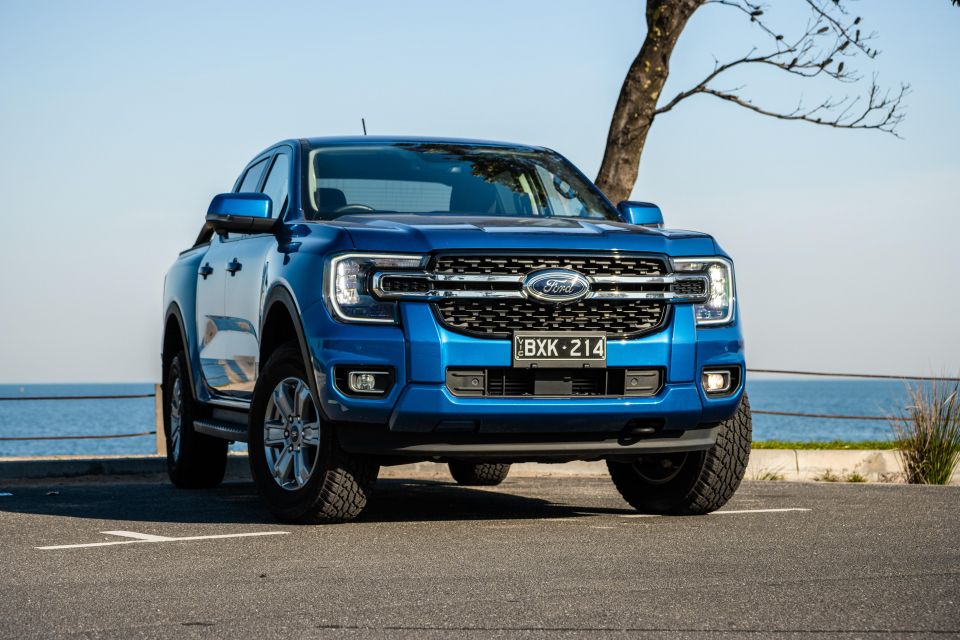
Ford has done a great job making the Ranger look and feel more modern inside and out, plus the way it drives blows a fair number of other utes out of the water completely.
The mid-spec XLT variant is an appealing proposition for those wanting a fair smattering of technology, as well as rugged and hard-wearing appointments
Despite almost being the same price as some flagship utes, it’s definitely the best-equipped workhorse variant and doesn’t skimp on any active safety equipment.
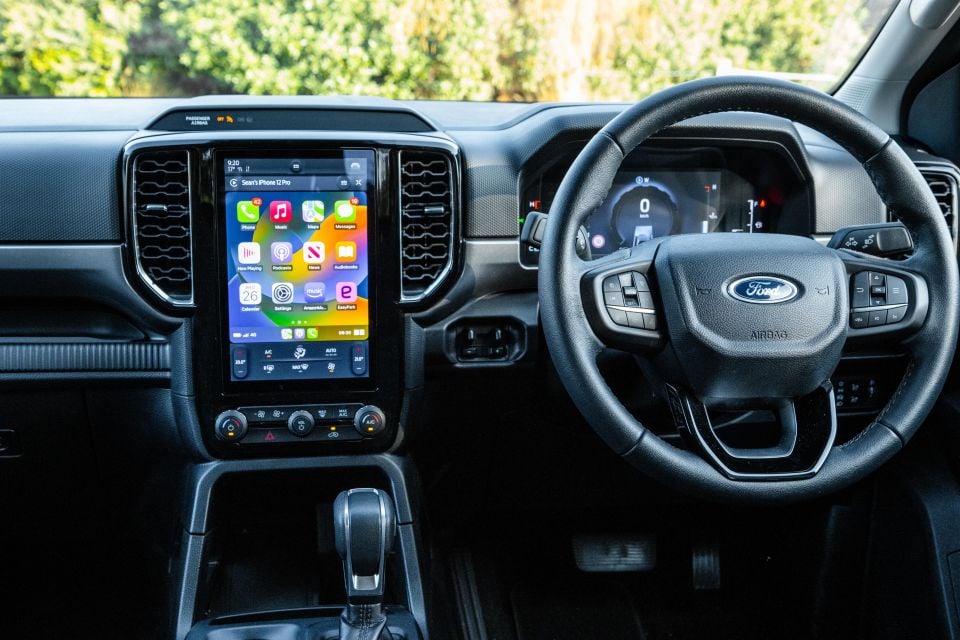
Our tester’s 2.0-litre Bi-Turbo four-cylinder diesel engine would be completely adequate if the in-demand 3.0-litre V6 turbo-diesel didn’t exist.
The latter’s extra torque and more sophisticated full-time four-wheel drive system does come in handy in certain situations.
If you’re wanting to save some money and are after a Ranger XLT right now though, it would be silly to not recommend the Bi-Turbo engine. It’s still one of the best four-cylinder diesel engines in the segment.
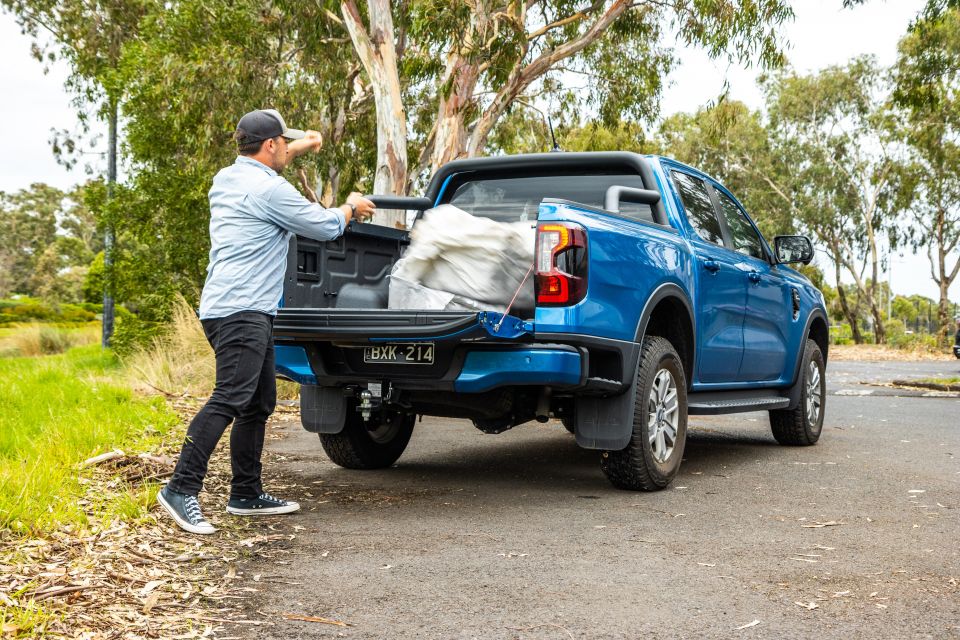
Click an image to view the full gallery
MORE: Everything Ford Ranger
Where expert car reviews meet expert car buying – CarExpert gives you trusted advice, personalised service and real savings on your next new car.
Jack Quick is an automotive journalist based in Melbourne. Jack studied journalism and photography at Deakin University in Burwood, and previously represented the university in dance nationally. In his spare time, he loves to pump Charli XCX and play a bit of Grand Theft Auto. He’s also the proud owner of a blue, manual 2020 Suzuki Jimny.


William Stopford
1 Month Ago
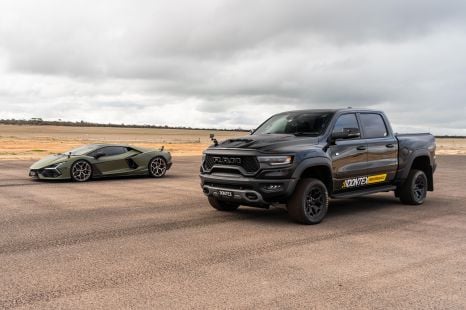

Paul Maric
25 Days Ago
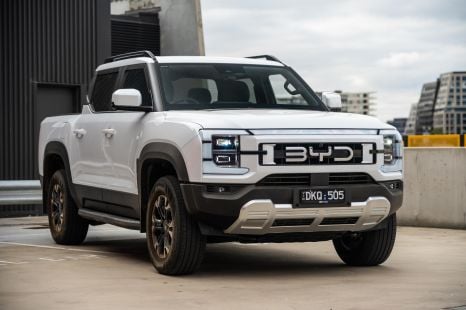

Max Davies
20 Days Ago
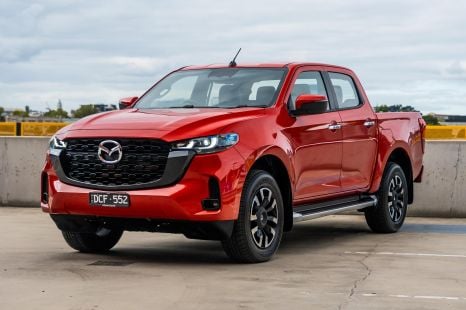

Josh Nevett
12 Days Ago
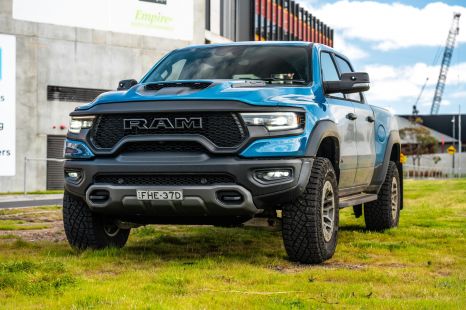

Max Davies
11 Days Ago
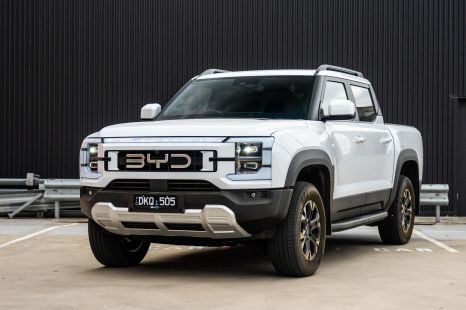

William Stopford
11 Days Ago